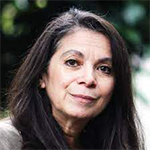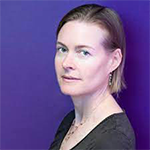What if everything they’ve told us about the Garden of Eden was wrong? Faced with what appears to be an apocryphal manuscript containing ten books and 91 chapters, Eve decides to tell her version of the story of Genesis: she was not created from Adam’s rib, nor is it correct that she was expelled for taking the apple from the serpent; the story of Abel and Cain isn’t true, neither are those of the Flood and the Tower of Babel…
In brilliant prose, Carmen Boullosa offers a twist on the Book of Genesis that dismantles patriarchy and rebuilds our understanding of the world—from the origin of gastronomy, to the domestication of animals, to the cultivation of land and pleasure—all through the feminine gaze. Based on this exploration, at times both joyful and painful, The Book of Eve takes a tour through the stories we’ve been told since childhood, which have helped to foster (and cement) the absurd idea that woman is the companion, complement, and even accessory to man, opening the door to criminal violence against women. Boullosa refutes this entrenched, dangerous perspective in her foundational and brazen feminist novel.
An Excerpt from Chapter 62: Adah’s Story
Midday. The hard, vertical light of the sun’s rays dragged on. Unusually, it had started beating down early in the morning and didn’t let up, ferocious, voracious, until the afternoon had begun. Exposed to its abject cruelty for hours, we scattered without thinking, as if its unmoving brightness made us hide from our mates.
We had visions of inconceivable things. On the white rock I painted a headless animal devouring a woman, eating with her gaping neck (her thorax’s fantastic mouth). I traced a herd of giraffes fleeing the ravenous animal, and two fallen palm trees; the sun had vanquished them, too.
The first, abrupt signs of the light fading were disconcerting; though it was to be expected and we desired it, it seemed unexpected in contrast with the solidity of the midday brilliance which had seemed eternal and had taken pleasure in beating down at our expense.
Exhausted, we were also fizzing with energy—so much light! The capriciously slow pace of time, which seemed to have stopped, but suddenly began to move, plus our former seclusion and the ideas it had given us, unleashed everyone’s anxieties. Overcome with emotion, we were all on edge, orphanlike.
In fact we were orphans; I, her mother, am an orphan; her father is an orphan (though he would often mention his divine origins). What else would you expect from our clan?
Exhausted, anxious, hungry and thirsty, we gathered around the fire where the stew murmured—my three daughters, Adam, Abel, our pets (which numbered nearly a dozen), and a few steps away, scores of animals that lived in captivity with Abel, he had tamed them (with his whip), they were under his command.
Beasts that lowed their master’s name. The cows: “A-bel”. The sheep and goats: “A-Beeeel.” Each species opening their throats and bleating in praise of their master, owner, oppressor; enslaved creatures yearning for the touch of their tyrant, their provider, their relief and their executioner. Abel never disguised the fact that he was their butcher.
Abel, the sinister light of their eyes, had long since established the slaughterhouse as provisioner of the household; animal blood had its influence on the table, our palates, my pots, our tongues, our taste. Abel had started it and Adam supported it; I gave in, I shared Abel’s knife and I carved a runnel for the ingredients of my stews into the hardest of stone.
With Cain I shared a pitchfork, a spade, the palms of our hands—he cared for his crops, just as I labored over my stews, the dough, the vegetables. With Abel, blows and incisions became part of preparing our food, too. With Cain, it was shaping, sowing, effecting change. With Abel, it was attacking. I was the seed from which they both sprang, so different. The seed grew there, in my oven and at the table where I prepared our meals.
We were all gathered together, except Cain. Usually he was the first to arrive, his arms full of things for the cooking pot—delicious blossoms, fruits, seeds or grains, sometimes already ground.
Cain was the first to leave that morning, before (long before) there was any sign of the unusual brightness of that day. He went to work, as he always did, earlier than Abel did to milk his goats.
Cain, by the way, was the only one who still refrained from eating meat. “Like consumes like. And if like consumes like, it goes both ways; sister will consume sister and brother will consume father.”
He said it like a sage, certain that eating sheep, cattle, birds would turn us into assassins of our own kind. Sometimes he went even further, asserting that it was wrong to gobble up creatures that had two eyes, like we did. Which reminds me, he found goat’s milk equally repulsive. “It’s a thief’s meal, you’re stealing from the mother what’s intended for her offspring.”
And so, at the end of that infernal day, Cain was the last to arrive. He was carrying a pale wooden wheel. He showed it to us, his pride evident in his words, knowing he had done something unique, special.
“It’s a sky wheel. I made it. Out of pieces of polished hardwood which I bent here…”
I went over to touch his invention. The handsome object was edged with wood that really was curved, assembled carefully to make an unbroken circle. I finished my inspection without a word; I didn’t need to say anything, I was filled with admiration for both the object and the deed.
Abel was the first to speak.
“Sky wheel?” he asked sarcastically.
Shifting the wheel to his left hand, Cain extended his right hand, raising his index figure to the horizon, and, turning on one foot, pointed to the circle the horizon made.
“That circle. With it…”
“The sky doesn’t have one circle, it has many,” Abel interrupted. “What you see fools your eyes. You have to look beyond first impressions. There are at least seven circles in the blue heavens. The Creator is in the first… Your wheel is wrong, it violates the Creator’s power.”
Cain’s features clouded over. He put his wheel down, leaning it against the floor.
Ara interrupted, “Abel, it’s dangerous to study the universe. Forget about that, or else you’ll lose your senses and you’ll be sure to fall upon misfortune and take us all down with you. Don’t say foolish things; trust what your eyes see.”
“Ara, I know how many circles there are in the heavens, which one the fallen angels inhabit, how Earth is suspended and spins. He whispered it to me, the greatest One of all…”
Cain’s expression hardened into anger. Ara noticed, and without taking her eyes off Cain, she said to Abel, “You don’t know anything. What you can’t see with your eyes…”
“Don’t be idiotic. If that were the case we wouldn’t be able to breathe, because we breathe what we can’t see but it keeps us alive, and the Spirit is in it and…”
“If your eyes don’t know how to see what’s in front of them, not even the air, you must have a pea brain.”
It wasn’t the first time an argument between Ara and Abel became heated. Each of them broke into verbal tirades. Abel insulted her. Ara retaliated with a bone that still had meat on it, which I had set aside to flavor the stew. Ara and Abel came to blows.
Cain separated them. Abel pounced on Cain, grabbing the wheel and hitting him with it. Ara snatched the wheel from Abel, tossing it out of his reach. The beautiful thing bounced as it landed and began to roll, to the delight and surprise of my two youngest daughters, who followed it out of the room. I was the only one who noticed that we all stopped when the wheel bounced.
Cain grabbed Abel with both arms. With all my might, I yanked Cain’s right arm, separating them. Abel looked at me, furious. I didn’t step back. Still holding Cain by the arm I walked straight out of the room. We left the others behind.
We passed the mangers beside Abel’s pen, moving into the darkness of night. We came to Cain’s fields, which had yet to produce at that time of year. The land was carefully groomed, orderly, cosseted, Cain tended to it regularly, watering it and fertilizing it; healthy, fertile land lying fallow.
The moon illuminated its furrows, casting a blue tint over them. They radiated a serenity, a peaceful light so unlike the hostile light that had hammered down on us throughout the day.
We walked. On both edges of the stream, the grass, which Cain had patiently cultivated, danced in the water’s path; the stream played with the moonlight, sprinkling silvery white glimmers across the grass.
We stopped.
The frogs croaked in unison. Sparks of liquid light traced two lines dancing along the edge of the water. The frogs’ throats raised their voices. Their song was yellow, more deceptive than the soft, serious light on the fields, more opaque than the sparks on the water. Some beast on the other side of the stream bellowed, its mate roared back. It was a mating call. We heard their bodies trampling the brush as they moved. Then, silence. The frogs ceased. The sparks dancing on the freezing water stopped, the creek became a cloudy stain, merging with the land. Silence.
Something hit both Cain and me. Not a physical object, but something that hurt just as much, on my skin, in my body and even deeper than that. Cain, who was downcast, suddenly raised both his arms and burst into tears. I put my arm around him, trying to console him; I was crying, too, desolate. We realized that something was happening that was making us cry.
When the moon came out the frogs began to croak again. They stopped. The crickets chirped, trying to assuage our grief and confusion. The moon went behind a veil, as if the knife of our grief had stopped the clouds, impaling them upon her.
The snake, which always slept at night, slithered its large body, hissing; the threat of its reptilian poison imposed silence and stillness.
The stream was black, the grass an invisible funeral procession.
I knew all too well that we weren’t present for what was happening where I prepared our meals; we didn’t need to be, we cried as events were taking place.
How long did Cain and I stand there like statues at the edge of the stream, aware of what our eyes could not see: what was happening beside the fireplace? Although it was beyond our field of vision, we saw without our pupils; our hands did not touch it, but we could feel it. We were in the collective consciousness, in an abysmal dimension whose light revealed the pain that wounded us from afar.
In silence Cain and I turned around and retraced our steps—and that was the only sound in the dark, endless night. Our path seemed as long as that interminable day. We returned without speaking a word, each step separating us further from one another.
Seconds before we arrived, Cain let go of my hand.
In the house an ominous silence had settled, the kind caused by the snake. Out of habit I went to stir the coals and feed the fire. As always, I turned to the dough for the bread, which was always next to the water jug. It wasn’t there. The jug sat filled with water. I looked around the table for the dough. The kitchen shone like a field after battle.



